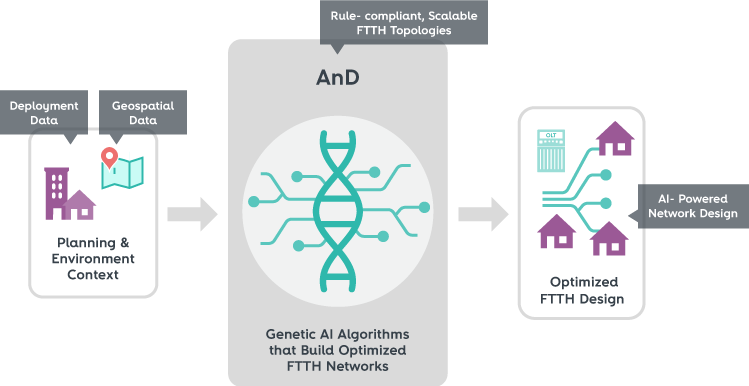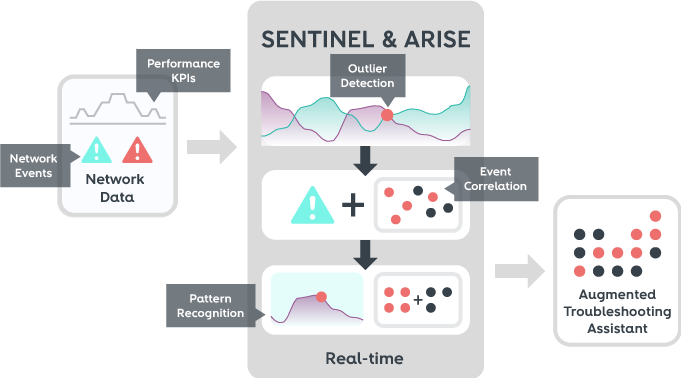Artificial Intelligence (AI) has rapidly become a staple of telecommunications (telco) operations. In just a short time, telcos have transitioned from experimenting with AI pilots to integrating AI-powered tools into their day-to-day workflows, enabling innovative solutions that can significantly improve operational efficiency, enhance customer experience, and drive network advancements while increasing automation and reducing operational costs.
The real transformation in telco is happening backstage, deeper within the network and its operational backbone, in the Operations Support Systems (OSS). OSS platforms manage some of the most complex tasks and activities in the telco environment, including fault management, service fulfillment, network assurance, and resource optimization.
Traditionally, these systems have been rule-based and reactive, often requiring manual intervention. However, as networks evolve into 5G, cloud-native, and software-defined ecosystems, the scale and complexity of OSS management are reaching unprecedented levels, with legacy methods struggling to keep pace with the transformational demands.
This gap between methods became more apparent with the application of generative AI (GenAI) in telco operations. AI was no longer just a nice-to-have but a must-have, helping CSPs navigate their own data landscapes more effectively, providing natural-language interfaces for complex systems, and generating actionable recommendations. Despite this, its role remains largely assistive, helping people work smarter, but still relying on human operators to carry out decisions.
Agentic AI represents the next step in the evolution of artificial intelligence and autonomy. Unlike other forms, such as GenAI, which primarily supports human productivity through content generation and insights, it is designed for autonomous execution.
Built with AI agents, these systems analyze, reason, decide, and act independently across the OSS domain, operating alone or in collaboration with other agents.
The path towards autonomous networks
The telco industry is evolving towards networks that can operate independently, configuring, healing, optimizing, and securing themselves without manual intervention. TM Forum’s Autonomous Networks Framework charts this progression, with the highest level representing full closed-loop autonomy, where networks proactively manage end-to-end operations.
Reaching this level requires more than just automation; it demands intelligence capable of interpreting complex environments and making real-time decisions. This is where Agentic AI becomes essential, by embedding reasoning and execution capabilities directly into network systems, it enables the shift from reactive processes to proactive autonomy.
TM Forum highlights the importance of intelligent agents and copilots in this journey, noting that their integration across business, service, and resource layers is key to achieving Level 4. Agentic AI isn’t just a supporting technology, but rather the catalyst that transforms autonomous networking from concept into operational reality.
Introducing NOSSIS Genius
NOSSIS Genius, the Agentic AI framework within the NOSSIS One suite, offers a modular ecosystem of AI agents that integrate seamlessly with any OSS environment. It transforms traditionally manual tasks into autonomous, adaptive, and proactive processes.
By leveraging Agentic AI, NOSSIS Genius enables intelligent automation across operational domains such as assurance, provisioning, and network design. This reduces the need for constant human supervision and helps lower operational expenses. Its agents operate in real time to detect, analyze, and resolve incidents (often before alarms are even triggered), resulting in reduced downtime and customer impact, and faster time-to-resolution.
The benefits provided go beyond just operational efficiency; NOSSIS Genius contributes to improved service quality and customer experience. Its agents anticipate failures, validate network changes, and interpret feedback to support more stable services, stronger SLA adherence, and lower churn. The modular, agent-driven architecture allows scaling across domains, enabling CSPs to expand operations without increasing team size.
What sets NOSSIS Genius apart is its Agentic intelligence. Its agents don’t merely process data, they translate high-level business intents into executable operational workflows, embodying a new paradigm of AI-driven autonomy. This adaptive behavior is further refined through Reinforcement Learning from Human Feedback (RLHF), enabling continuous improvement and alignment with evolving business goals.
The foundation for this Agentic AI ecosystem is the NOSSIS Genius AI studio that allows the quick development and deployment of new agents, which can be adapted to the various requirements of the operational use-cases CSPs face on their network. With a set of standard interfaces to connect with other systems and data sources in the network, and a workflow engine that allows a rapid customization of agents’ behavior. NOSSIS Genius AI studio is a must-have tool to extend operational efficiency and automation throughout the entire network.
Complementing this is the platform’s LLM Gateway, which adds a critical layer of flexibility and control through its Bring-Your-Own-LLM capability. Whether integrating with leading AI platforms like Azure, Bedrock, or Vertex AI, or operating entirely within private infrastructures, it ensures secure, compliant, and scalable deployment. It also supports full governance through built-in monitoring, retraining, and evaluation features, empowering CSPs to maintain oversight and adapt models to evolving network demands.
Supporting this framework is NOSSIS Genius Knowledge Assist, a dynamic knowledge base that learns from daily operations. By analyzing tickets, past resolutions, and recurring issues, it turns historical data into actionable recommendations. Acting as an intelligent copilot, helping resolve issues with greater speed, consistency, and autonomy.
NOSSIS Genius establishes the foundation for autonomous operations within OSS by combining agentic intelligence, adaptive learning, and a dynamic knowledge base.
Meet some of our agents
To realize the full potential of autonomous operations, NOSSIS Genius also offers a set of predefined specialized AI Agents, each designed with a distinct role and behavior, enabling it to execute operational tasks with purpose, context-awareness, and adaptability. Ultimately, collaborating to deliver intelligent automation across the OSS landscape. Their excellence has also been recognized across the industry, earning awards at both the FutureNet World Awards and the AI Breakthrough Awards for their contributions to advancing autonomous telco operations.
- AnD: Built for Autonomous Network Design, this agent automates network design by transforming location-based data into optimal topologies, boosting design productivity while ensuring rule compliance and scalable infrastructure layouts.

- ARISE: Focused on enhanced Root Cause Analysis, the AI-driven system learns from network behavior to automatically correlate complex faults, analyze alarms and performance data recursively, and accelerate resolution beyond traditional methods.
- SENTINEL: Designed for Proactive Anomaly Detection, this adaptive agent applies AI curve profiling to learn each network’s unique behavioral patterns. It identifies deviations in real time, anticipates failures before they occur, and continuously refines its detection models as the network evolves.

- AURA: Tailored for Cognitive Call Center Assistance, this voice-aware agent listens and interprets customer complaints, correlates them with real-time network data, and enables proactive diagnostics that shorten resolution times and improve service accuracy.

- ORBIT: Crafted for Autonomous Ticket Resolution, it automates the entire trouble ticket lifecycle, from summarization and root cause prediction to team assignment and resolution suggestion, using historical knowledge to accelerate resolution and reduce onboarding effort.
Final takeaways
With CSPs seeking autonomous solutions to manage network complexity and performance, the need for intelligent systems within OSS is becoming increasingly critical for operator success. AI is evolving from a support tool into a core operational capability, one that can understand, decide, and act upon with minimal human intervention.
NOSSIS Genius reflects this shift by embedding Agentic intelligence directly into OSS workflows. Its modular architecture, adaptive learning, and specialized agents work together to streamline operations, improve service reliability, and support scalable growth. In doing so, NOSSIS Genius lays the groundwork for the transition to autonomous, self-optimizing networks, aligning with the industry’s vision for closed-loop, intelligent operations.
